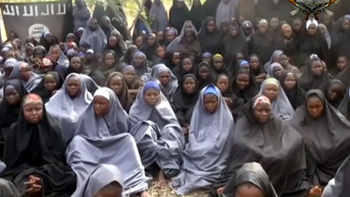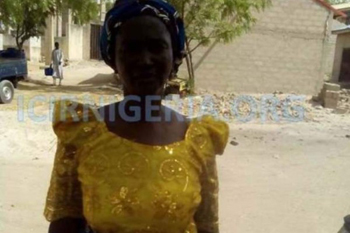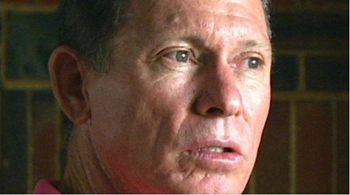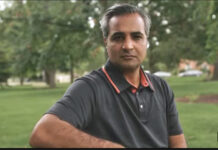One woman released by Boko Haram says she knows where schoolgirls are being held
By Mark Ellis

It has been a year since the kidnaping of 232 Nigerian schoolgirls gained world attention. Sadly, the first babies born to the schoolgirls due to rape arrived in February. Four girls who managed to escape the terror group said they were raped almost on a daily basis, according to a report by World Watch Monitor (WWM).
The four girls said those who did not cooperate with the rebels faced severe punishment. Other girls captured previously who managed to escape said some girls were killed because they would not renounce their Christian faith, WWM reported.
Meanwhile, a woman recently released by Boko Haram reports she was held in the same location as the schoolgirls — Gwoza town in Borno state, according to the International Center for Investigative Reporting (ICIR).

Mbutu Papka, 56, was kidnapped in July 2014 and held by the insurgents for eight months in two locations.
She says the abducted schoolgirls are being held under very tight security in a house in Gwoza. Ms. Papka said no one is allowed near the fenced building where the abducted girls are being held under 24-hour security.
People in the area informed Papka the girls were inside. Because access to the house is restricted, the girls apparently do their own cooking and chores, according to ICIR.
The Nigerian Government has been under severe criticism for the way it has dealt with the crisis. Many say it has not done enough to secure the girls’ release or to support their families.
Australian Stephen Davis was involved in negotiations for the release of the schoolgirls and he goes so far as to say the government was complicit in their abduction.
Davis served as Director at the International Centre for Peace and Reconciliation at Coventry Cathedral in the U.K. in 2005 and 2006. He also served as an advisor to two Nigerian presidents.
Although Davis reached an agreement for the release of about 60 girls, the exchange was compromised. In October, there was further hope for an agreement freeing the girls. But as the news broke, fighting intensified and a person claiming to be the leader of the group declared there was no deal.
Davis said he came close to brokering a release several times, only to have each handover ruined at the last

moment, according to World Watch Monitor.
Davis became aware that powerful figures with “vested interests” were sabotaging his efforts to reach a deal. “While I was making efforts to secure the release of the girls, I realized that if I got 30 or 40 girls out, the political backers of the group would have the militants kidnap another 60 to replace them and a further 100 villagers would likely die in the process. I became very frustrated. The backers threatened that any commander of the group who agreed to participate in any peace dialogue or handover of girls would be slaughtered by other commanders,” he told WWM.
Davis implicated a former a government official in funding the group for political gains. In addition, he accused another defense official of pocketing money from the defense budget designed to fight the insurgency. He also said a senior Central Bank of Nigeria official provided an official channel by which to supply a Boko Haram agent in Egypt with funds to buy the outlaw group weapons and military uniforms.
“In short, the sponsors of Boko Haram clearly want to show that a Christian President cannot overcome the current insecurity caused by Muslim extremists,” Davis told WWM.
Davis concluded that the first step to defeat the radical group is to arrest their sponsors, cut off arms supplies and communications, and isolate them geographically.
Observers say Nigeria has one of the most complex political landscapes in the world. Although Davis was not the first to accuse Nigerian politicians of supporting Boko Haram, his detailed allegations created further embarrassment.
Nearly a year after making his allegations, Davis told WWM that despite media criticisms, he stands by his assertion.
“If you worry about defending your reputation you are back fighting where they are comfortable and they have strength,” he said. “Jesus didn’t do this. The New Testament is not full of Jesus walking around justifying himself. He carried on with the work.”
“If you have sought the Lord before you have gone into it, it is irrelevant whether you see or don’t see a result. You do it in good faith that this is what the Lord wanted you to do and that He will provide the ways, the means and the strength to do it.”
Davis said he maintains contact with factions within Boko Haram. Recently he received a message from one of his contacts in the group which read: “Moving a large number of girls across the border from Nigeria into Niger.” When Davis asked why, the source replied: “The contract is almost over,” he reported to WWM.
“This proves yet again that politicians are paying money to create this sort of mayhem – paying to have people slaughtered!” Davis charged. “This is terrible! These guys are getting paid to go and slaughter tens of thousands of people.”
“I have visited many villages and towns attacked by Boko Haram. I have seen first-hand the devastation and talked to families in the attacks. These are tragic stories of loss of life, slaughter, rape and the worst abuses of human life one can imagine,” he said.
“The Christian churches and congregations around Gwoza on the Cameroon-Nigeria border have been decimated, with many congregations killed in their churches.” Davis said he asked the local Bishop how many people were killed in the most recent attack on Gwoza, and the bishop replied, “We have yet to see any living.” And there have been several other attacks on Gwoza, according to WWM.
By the count of the Archbishop, the Anglican Church in Nigeria has lost 60 churches in its province covering the northeast. In one area, 36 of 42 churches have been lost.
Davis pointed out “the report relates to the Anglican Church only. Keep in mind that there are at least as many Catholic Churches in that area and at least three or four times the number of Pentecostal Churches that would be affected in similar ways.”
“People in the north of Nigeria face unbelievable hardship. Some women walk all day to get a bucket of muddy water. People are thin as rakes because there is not enough food. You wonder what the future holds for a child born there. But they go on. There is hope and a desire to live. They don’t despair. Those who have the least in Nigeria are not the ones who despair over their general living conditions, the lack of water and the lack of food… It is the war and terror that causes them despair,” Davis said.
“These Christians feel abandoned by their brothers and sisters and the rest of the world. They are asking, ‘Why aren’t we hearing from them? Why aren’t they trying to help us? Why aren’t they trying to stop this?’ When word seeps through that congregations in the West are praying for the situation of Christians under attack in Nigeria’s northeast, they weep to know they are being held up in prayer.”
“More must be done to support the Church in the northeast,” he said, “and to get word to these Christians that they are being prayed for.”




I will pray for all of GOD’S people, I passed the word on to other Christian’s so they would pray too!
God have mercy!
Comments are closed.